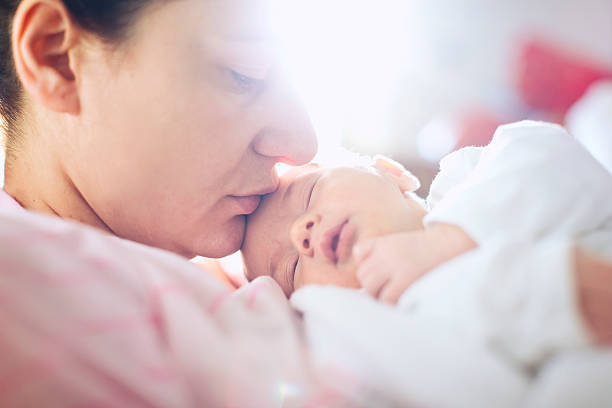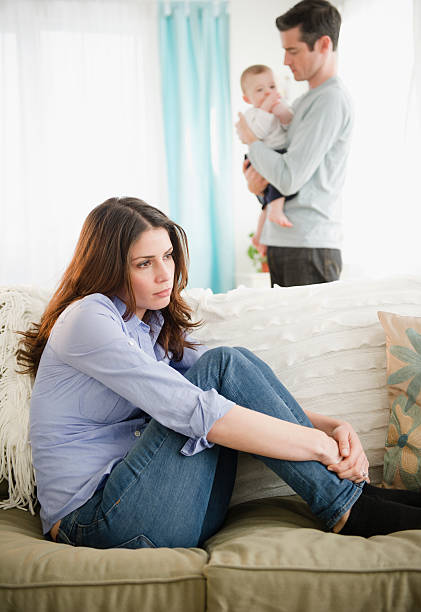Symptoms of Postpartum Depression:
Becoming a mother is the best time in every woman’s life. But a woman has to deal with many physical and mental problems after becoming a mother. Your overwhelming emotions after delivery changes. It is usual to experience a drop in mood during your baby’s first two weeks. Following that, you should feel better. However, if you’re still unhappy or even despairing weeks later and your sentiments are getting worse, you’re experiencing more than the usual early postpartum emotions.
Do Not Ignore these Following Signs After Delivery, It can lead to Postpartum Depression
Sadness or guilt dominates your thoughts. Some parents may become irritated from time to time. Women may experience fatigue or weakness after delivery. Apart from this, many women also start gaining weight rapidly. In addition, many women experience stress, anxiety, or depression post the delivery. In this situation, they may feel sadness, loneliness or despair. This is known as postpartum depression. Really, postpartum misery emerges since the mother’s duties develop drastically after conveying a child.
Symptoms of Postpartum Depression
Postpartum depression is very common. Most women have to face this problem after delivery. After the birth of child, they have to experience hormonal, emotional, social and financial changes. Due to all these changes and responsibilities, women can get into depression. But many times women are unable to understand postpartum depression. In such a situation, it is very important for you to pay attention to its symptoms.
Postpartum depression
If a mother always remains depressed or sad after giving birth to a child. She does not feel like doing household or office work, then this can be a common sign of postpartum depression. Not only this, in this situation, women are not able to do the work of their newborn baby properly. Women who have postpartum depression begin to blame themselves for their children’s crying or illness. They feel guilty for every work. If you also feel depressed all the time, then definitely meet a doctor once.
Being in anxiety or stress
When a newborn comes to the house, happiness is seen on the faces of all the members. Everyone is excited and starts preparing for it. A mother is most excited for her child. but you are in stress and constantly worrying after giving birth to the child. If you feel lonely and have negative thoughts all the time, this might be an indication of postpartum depression. If after some time of delivery, instead of being happy, you are in stress, then it is very important to meet a doctor.
Loss of interest
If after delivery, your interest in those things has decreased, which you used to enjoy the most. Or you do not even feel like doing your hobbies or favorite work, then do not ignore this sign either. You lose interest and drive in activities you enjoy. Loss of interest in pastimes shows that the individual is depressed. To maintain a strategic distance from postpartum sadness, it is exceptionally important for you to center on your side interests. You may even show less interest in your newborn baby.
More or less hunger
After delivery, it is important for women to take special care of their diet. In such a situation, if women eat food from time to time and consume healthy foods. But if you feel less or more hungry, then it can be a sign of postpartum depression. Many women do not even eat food in this situation. In this situation, women start having.
More or less sleep
When you become a new parent, your sleep and eating habits will naturally alter. However, if you can’t sleep even while your child is napping, or if you’re sleeping all the time, it’s most likely due to anything other than a new sleep pattern. If after delivery you feel sleepy all the time or do not sleep at all, then these are also considered symptoms of postpartum depression. When a person does not sleep properly, he may feel tired. This causes stress and anxiety, which can bother him. If you also feel less or more sleep, then definitely visit a doctor once.
You have difficulty making judgements or focusing.
Maybe you are too weary to think clearly. Perhaps you don’t care. If you can’t decide whether to get out of bed, take a shower, change your baby’s nappy or go for a stroll, it might be an early indicator of postpartum depression.
You’re worried you won’t be a good parent.
Parents with ill, preterm, or special-needs newborns are more likely to be concerned about parenting. However, if this is not your scenario, having persistent worries about yourself as a parent may signify something different.
You’ve lost drive, energy, and interest in your infant.
If you detect a change in your ability to be active, a drop in interest in your baby, or a feeling that you don’t want your kid, contact your doctor right away. This is another sign of postpartum depression.
You consider hurting yourself or your kid.
Suicidal thinking or thoughts of harming yourself or your baby are advanced symptoms of postpartum depression, as is postpartum psychosis, an uncommon and dangerous mental disease that occurs alongside postpartum depression.


